When you’re dealing with a damaged or missing tooth, the decision between a dental implant vs crown can feel overwhelming. You want the best solution for your smile, your budget, and your long-term oral health—but with so much conflicting information out there, how do you know which path is right for you?
Here’s the truth: both dental implants and crowns can restore your confidence and help you eat, speak, and smile naturally again. But they work in very different ways, and the best choice depends on your specific situation. Let’s break down everything you need to know so you can make an informed decision with confidence.
Key Takeaways
- Dental implants replace the entire tooth structure (root and crown) and are ideal for missing teeth or teeth that need extraction
- Dental crowns cap and protect existing damaged teeth that still have healthy roots
- Implants offer superior longevity (20+ years) compared to crowns (10-15 years) but require a longer treatment process
- Cost considerations vary significantly—implants have higher upfront costs but may be more economical long-term
- Your specific situation (bone health, gum condition, remaining tooth structure) determines which option is best for you
Understanding the Basics: Dental Implant vs Crown
Before diving into comparisons, let’s clarify what each treatment actually involves.
What Is a Dental Implant? 🦷
A dental implant is a complete tooth replacement system consisting of three parts:
- Titanium post (implanted into the jawbone)
- Abutment (connector piece)
- Crown (visible tooth portion)
The implant essentially creates an artificial tooth root that fuses with your jawbone, providing a stable foundation for a new tooth. Our team specializes in this advanced procedure, helping patients regain their natural smile and confidence.
What Is a Dental Crown? 👑
A dental crown is a cap that covers and protects a damaged existing tooth. Think of it as a protective helmet for your tooth—it restores the shape, size, strength, and appearance while preserving the natural tooth structure underneath.
When to Choose a Dental Implant
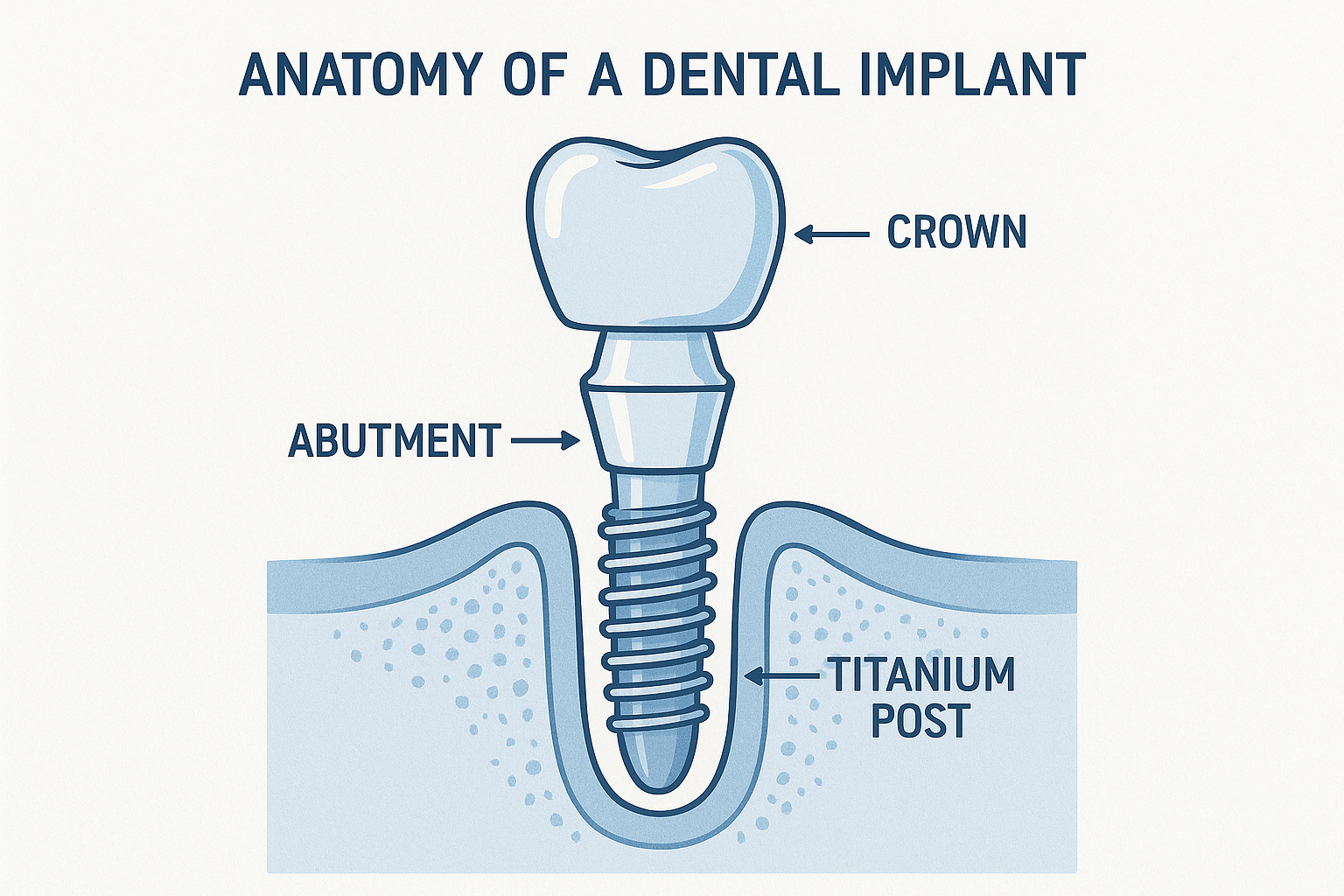
Dental implants are typically the best solution when:
Missing Teeth Situations
- Complete tooth loss from injury or extraction
- Severe decay where the tooth cannot be saved
- Failed root canal treatments
- Congenitally missing teeth
Advantages of Dental Implants ✅
Longevity: With proper care, implants can last 20-30 years or even a lifetime
Bone preservation: The titanium post stimulates jawbone, preventing bone loss
Natural function: Chew, speak, and smile with complete confidence
No impact on adjacent teeth: Unlike bridges, implants don’t require altering neighboring teeth
Easy maintenance: Brush and floss just like natural teeth
Potential Drawbacks ❌
Treatment time: The process typically takes 3-6 months due to healing periods
Surgical procedure: Requires minor oral surgery, though most patients experience minimal discomfort
Upfront investment: Higher initial cost compared to crowns
Bone requirements: May need bone grafting if insufficient bone density exists
When to Choose a Dental Crown
Crowns are the ideal choice when:
Damaged but Salvageable Teeth
- Large cavities that have weakened the tooth
- Cracked or fractured teeth with healthy roots
- After root canal treatment to protect the treated tooth
- Severely worn teeth from grinding or acid erosion
- Cosmetic improvements for misshapen or discolored teeth
Advantages of Dental Crowns ✅
Preserves natural tooth: Keeps your original tooth root intact
Faster treatment: Usually completed in 2-3 visits over a few weeks
Lower initial cost: More affordable upfront investment
Proven track record: Decades of successful use in dentistry
Versatile materials: Options include porcelain, metal, or combination materials
Potential Drawbacks ❌
Shorter lifespan: Typically need replacement every 10-15 years
Requires healthy tooth structure: Not suitable if too much of the original tooth is damaged
Potential for future issues: The underlying tooth can still develop problems
Sensitivity: Some patients experience temporary sensitivity after placement
Dental Implant vs Crown: Side-by-Side Comparison
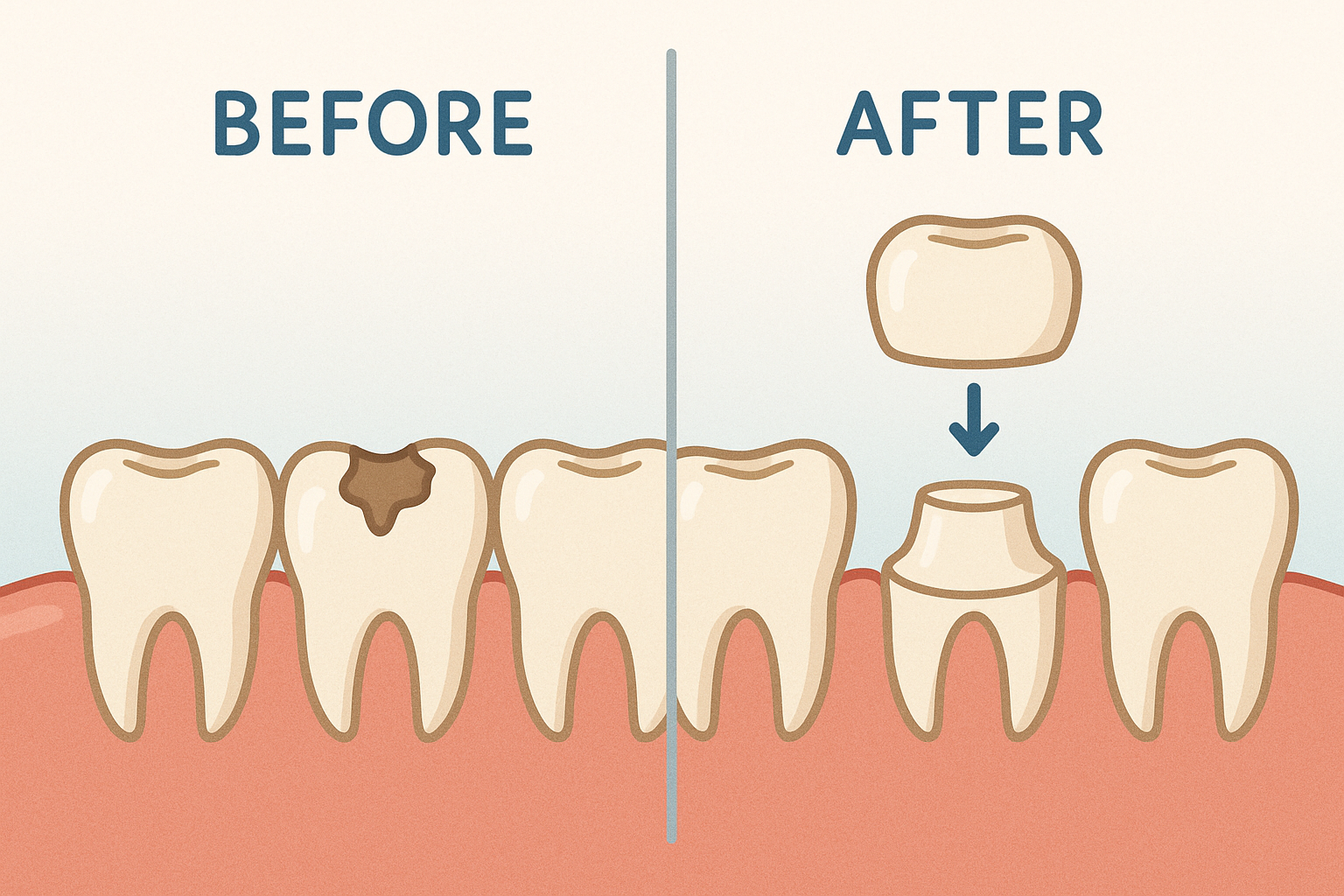
| Factor | Dental Implant | Dental Crown |
|---|---|---|
| Best for | Missing or non-restorable teeth | Damaged but salvageable teeth |
| Treatment time | 3-6 months | 2-3 weeks |
| Lifespan | 20+ years | 10-15 years |
| Initial cost | Higher | Lower |
| Long-term value | Excellent | Good |
| Bone preservation | Yes | No |
| Surgery required | Yes (minor) | No |
| Maintenance | Standard oral hygiene | Standard oral hygiene |
Cost Considerations: Making the Financial Decision
Understanding the financial aspect of dental implant vs crown decisions helps you plan effectively.
Dental Implant Costs 💰
- Initial investment: $3,000-$5,000 per tooth
- Includes: Implant post, abutment, and crown
- Additional costs: May include bone grafting or extractions
- Long-term value: Cost per year is often lower due to longevity
Financing options and affordable solutions may be available to make treatment accessible.
Crown Costs 💰
- Initial investment: $800-$2,500 per tooth
- Varies by material: Porcelain costs more than metal
- Replacement factor: Budget for future replacements
- Total lifetime cost: May exceed implant costs over 20+ years
The Treatment Process: What to Expect
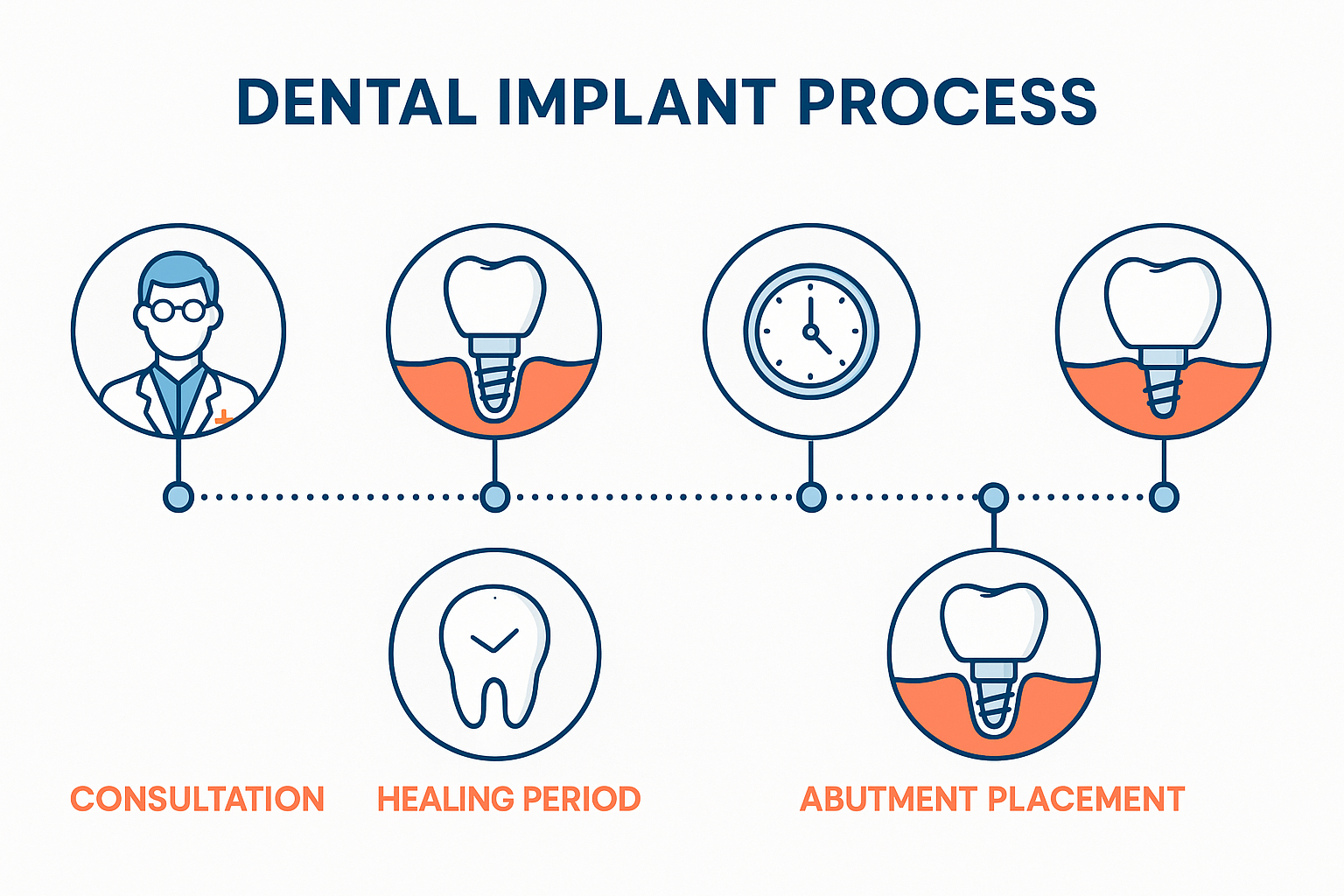
Dental Implant Process 🔄
- Consultation and planning – Comprehensive exam and 3D imaging
- Implant placement – Minor surgical procedure (1-2 hours)
- Healing period – 3-6 months for osseointegration
- Abutment placement – Connector piece attachment
- Crown placement – Final restoration attachment
Learn more about dental implant healing stages to understand the complete process.
Crown Process 🔄
- Consultation and prep – Tooth examination and preparation
- Impression taking – Molds for custom crown creation
- Temporary crown – Protection while permanent crown is made
- Crown placement – Final restoration fitting and bonding
- Follow-up – Ensuring proper fit and function
🦷 Dental Treatment Decision Tool
Answer a few questions to discover whether a dental implant or crown might be right for you
1. What is your current tooth situation?
2. How important is longevity to you?
3. What is your timeline preference?
4. How do you feel about minor surgical procedures?
Success Rates and Long-Term Outcomes
Dental Implant Success Rates 📊
Modern dental implants boast impressive success rates:
- Overall success rate: 95-98%
- 10-year survival: 95%+
- 20-year survival: 90%+
Factors affecting success include:
- Proper oral hygiene maintenance
- Regular dental checkups
- No smoking
- Adequate bone density
- Overall health status
Crown Success Rates 📊
Dental crowns also have excellent track records:
- 5-year success: 95%+
- 10-year success: 85-90%
- 15-year success: 75-80%
Success depends on:
- Quality of underlying tooth structure
- Proper fit and placement
- Material choice
- Oral hygiene habits
- Avoiding excessive force (teeth grinding)
Special Considerations
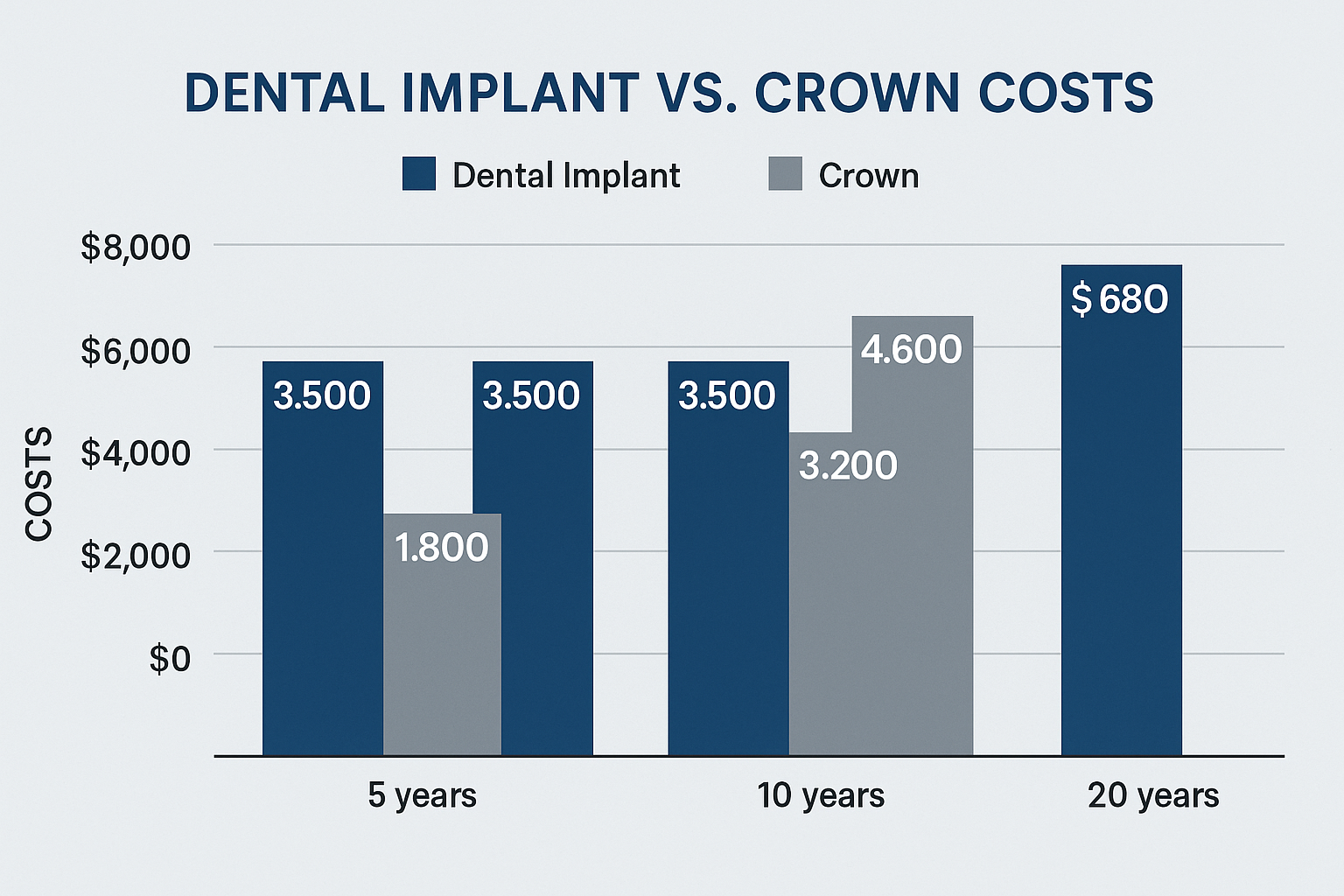
Age Factors 👥
Younger patients (under 30):
- May prefer implants for longevity
- Have excellent healing capacity
- Should consider lifetime tooth replacement needs
Older patients (over 65):
- May prioritize quicker treatment (crowns)
- Could have medical considerations affecting surgery
- Should evaluate cost-benefit based on life expectancy
Medical Conditions 🏥
Certain conditions affect treatment choice:
Diabetes: May slow implant healing but doesn’t prevent treatment Heart conditions: Require medical clearance for surgery Osteoporosis: May affect bone integration for implants Cancer treatment: Timing considerations for implant placement
Always discuss your complete medical history during consultation.
Maintenance and Aftercare
Caring for Your Dental Implant 🧼
- Brush twice daily with soft-bristled toothbrush
- Floss daily using implant-specific floss or water flosser
- Regular checkups every 6 months
- Avoid hard foods that could damage the crown
- Don’t smoke as it increases failure risk
Understanding how to fix dental implants if issues arise can help you maintain your investment long-term.
Caring for Your Crown 🧼
- Standard oral hygiene routine
- Be gentle around the crown margins
- Avoid sticky foods that could dislodge the crown
- Use a nightguard if you grind your teeth
- Regular dental visits for monitoring
Making Your Decision: Questions to Ask
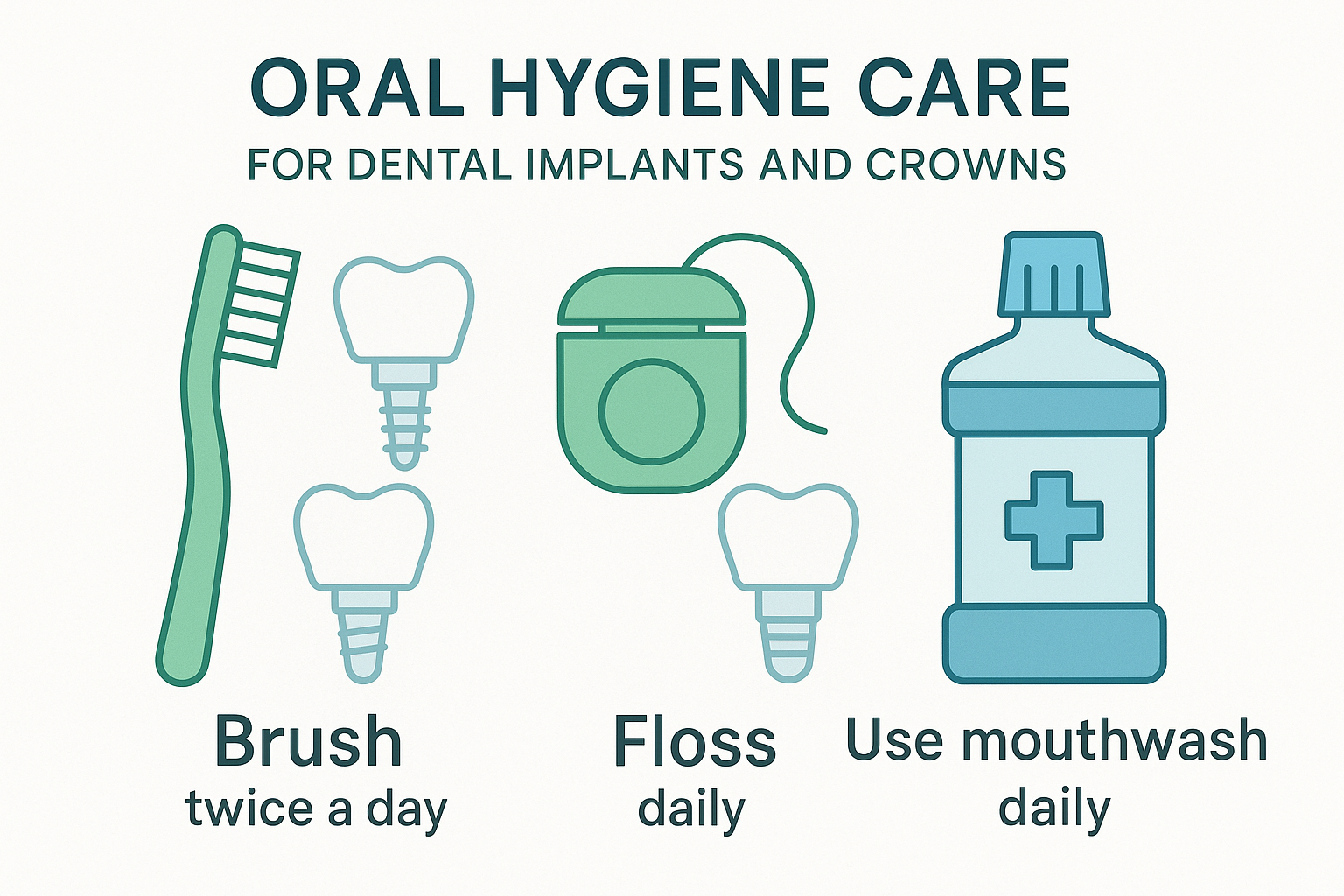
When consulting with your dental team, consider asking:
About Dental Implants 🤔
- Am I a good candidate for implant surgery?
- Do I need bone grafting or other preparatory procedures?
- What is the total timeline from start to finish?
- What are the payment and financing options?
- What happens if the implant doesn’t integrate properly?
About Crowns 🤔
- How much of my natural tooth structure can be preserved?
- Which crown material is best for my situation?
- How long should I expect this crown to last?
- What are the signs that a crown needs replacement?
- Can this tooth develop problems in the future?
Real Patient Experiences
Sarah’s Implant Journey 👩
“I was nervous about the surgery, but the team made me feel so comfortable. The healing was easier than I expected, and now I completely forget which tooth is the implant. It’s been 5 years, and it feels just like my natural teeth.”
Mike’s Crown Success 👨
“My dentist explained that my cracked tooth could be saved with a crown. The process was quick—just three weeks from start to finish. The crown looks perfect, and I can eat all my favorite foods again without worry.”
When to Seek Professional Consultation
Don’t delay seeking professional advice if you experience:
- Tooth pain or sensitivity
- Visible damage to teeth
- Missing teeth affecting your confidence or function
- Difficulty chewing or speaking
- Cosmetic concerns about your smile
Early intervention often provides more treatment options and better outcomes.
Conclusion: Your Path to a Confident Smile
The choice between a dental implant vs crown isn’t always straightforward, but understanding your options empowers you to make the best decision for your unique situation.
Choose a dental implant when:
- You have a missing tooth or one that can’t be saved
- You want the longest-lasting solution
- You’re comfortable with a surgical procedure
- You can wait 3-6 months for completion
Choose a dental crown when:
- Your tooth is damaged but has healthy roots
- You need faster results
- You prefer to avoid surgery
- You want to preserve your natural tooth
Remember, there’s no universal “right” answer—only what’s right for you. Your oral health, lifestyle, budget, and personal preferences all play important roles in this decision.
Our experienced team is here to guide you through every step of the process, from initial consultation to your beautiful final result. We believe everyone deserves a smile they’re proud of, and we’re committed to making that dream accessible and affordable.
Ready to take the next step? Schedule your consultation today to explore your options and create a personalized treatment plan. Whether you choose an implant or crown, we’ll ensure you receive the highest quality care in a comfortable, supportive environment.
Your perfect smile is waiting—let’s make it happen together! 😊

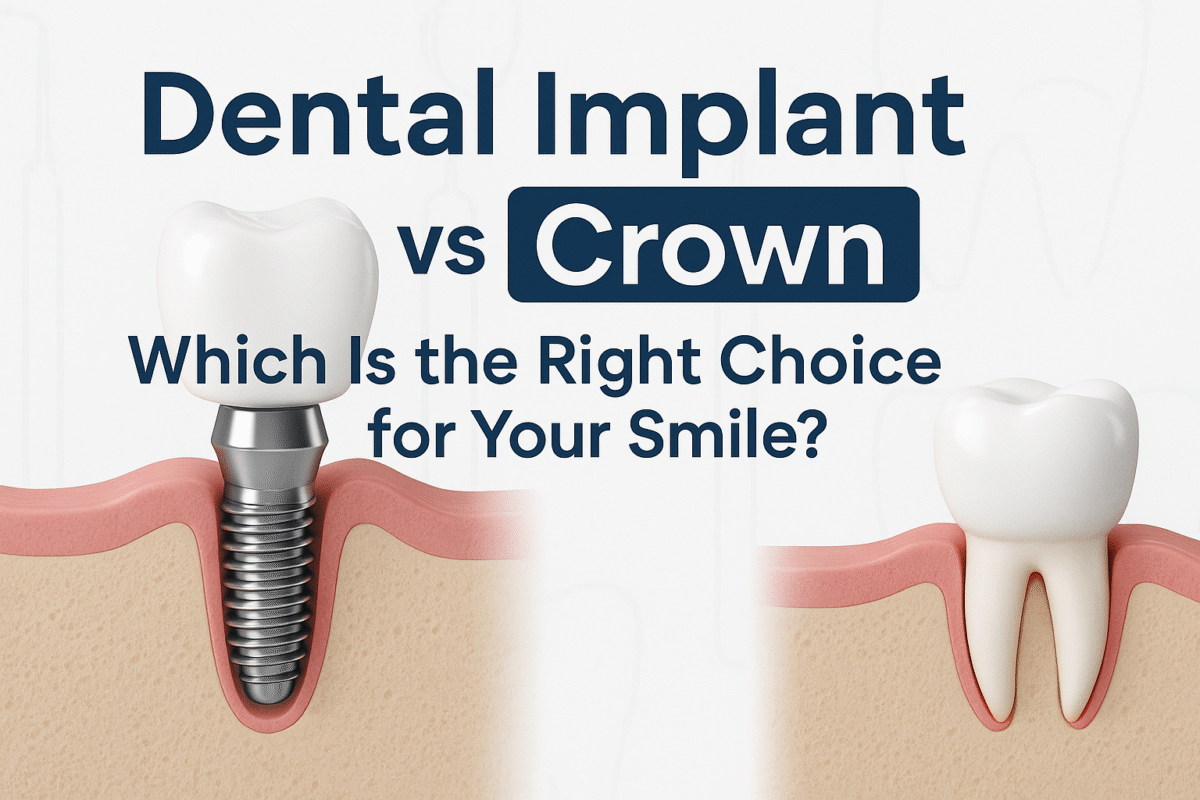
Leave a Reply
Share your thoughts or ask a question about dental implants. Your email address will not be published.